Dr. Emanuel’s Sarsaparilla – Vicksburg, Mississippi
05 June 2015 (R•060615)
“and none got too excited about it, but they wanted to buy it.”
![]() Incoming e-mail about an interesting sarsaparilla bottle from an old Mississippi collection. See low res pictures at the top of this post. Let’s take a moment to check out Dr. Emanuel’s Sarsaparilla from Vicksburg, Mississippi. Never seen or heard of this one before. Here is the e-mail:
Incoming e-mail about an interesting sarsaparilla bottle from an old Mississippi collection. See low res pictures at the top of this post. Let’s take a moment to check out Dr. Emanuel’s Sarsaparilla from Vicksburg, Mississippi. Never seen or heard of this one before. Here is the e-mail:
Hi, I have this bottle that I bought with an old collection. It is embossed, “Dr. Emanuel’s Sarsaparilla, Vicksburg”. It is shaped like a “Swaim’s Panacea”, and it is open pontil. Can you give me any information on it? I showed it to some Mississippi guys at the Jacksonville show, and none got too excited about it, but they wanted to buy it. A friend of mine who knows bottles well said he has never seen the bottle. Thanks
Gene from Louisiana
Yes indeed, the bottle does look like a Swaim’s Panacea which is pictured above. Though I could find no direct advertising for the bottle, I did get the following advertisement clipping from Eric McGuire and advertising envelope from Marianne Dow.
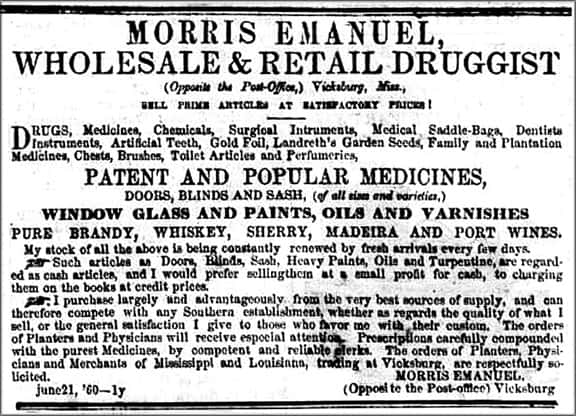
Morris Emanuel, Wholesale & Retail Druggist advertisement – The Register (Monroe, Louisiana) June 21, 1860
Dr. Morris Emanuel was a long-time druggist, bookseller, physician and railroad man in Vicksburg, Mississippi. Most Federal Census reports put his birth about 1804 in Virginia though his obituary (see bottom of post) clarifies his birth as being in Stafford County, Virginia on 15 October 1803. The notice below is from the History of Mississippi and it mentions his name as an early physician of Vicksburg. He was raised, educated and married in Virginia. In 1836, Morris moved to Vicksburg, Mississippi and commenced the practice of medicine. In 1840 he entered the drug business and continued in this area until the break-out of the Civil War.
Among the early physicians were Dr. Thomas Anderson, Dr. Robert J. Harper, Dr. Hagaman, Dr. Hugh I. Bodley, Dr. James Crump, followed later by his brother, Dr. George P. Crump; Dr. Thomas M. Jackson, Dr. R. H. Broadnax, Dr. John G. Parham, Dr. Wm. T. Balfour, Dr. Walter Puckett, Dr. B. J. Hicks, Dr. Morgan, Dr. Alex. Hensley, Dr. Allen, Dr. Albert Chewning, Dr. M. M. Pallen, Dr. Morris Emanuel, subsequently for a number of years president of the Vicksburg and Meridian Railroad Company; Dr. George K. Birchett, Dr. James C. Newman, Dr. Church, Dr. Robert J. Turnbull, Dr. Daniel B. Nailor and Dr. Willis M. Green, the brother of General Duff Green, the distinguished journalist. – A History of Mississippi: From the Discovery of the Great River by Hernando DeSoto, Including the Earliest Settlement Made by the French Under Iberville, to the Death of Jefferson Davis, 1891
As noted above, Dr. Morris Emanuel was also a railroad man. How he could be a physician, druggist and railroad president at the same time escapes me but he was.
Not only was he instrumental in the development of Vicksburg area railroads, he also had to endure railroading during the Civil War and all of the damage inflicted on his stations, depots, stock, bridges and rails. There were also huge debts left by the defeated Confederate army. Here is a page from Mississippi Railroad Heritage:
After the War Between the States, especially in the years 1865 – 1866, managers and executives of the railroads of the South were hard pressed to find money to rebuild the tracks and depots that were destroyed during the conflict. The message shown below was written by the President of the Southern Railroad, the old Vicksburg to Meridian route, first opened with mule power in 1836 and operated with steam locomotives to Clinton and Jackson in 1840. The Southern completed the line to Meridian in 1861.
SOUTHERN RAILROAD COMPANY, Morris Emanuel, President
SEPTEMBER 11, 1865 CIRCULAR, Philadelphia, Pa., to Bondholders and Creditors of the Co.
“The Southern Railroad Company has suffered seriously in its interests, by the four years of bloody civil war that has just closed, and as President of the Company, I have been instructed by the Board of Managers to see our creditors, and lay before them a full and frank exhibit of the condition of the road, and the financial affairs of the company.”
“We met our obligations with satisfactory punctuality up to the first of January, 1861, and until the ever memorable civil war became inevitable our prospects were growing brighter and brighter.”
“The entire construction of the Southern Railroad, for 140 miles, was not completed until June, 1861, and for nine months previous to that date, the trains ran no farther east than Newton Station, 109 miles from Vicksburg. Notwithstanding the hindrances to business and the difficulties incident to the active work of construction then going on, and for three-fourths of the year the trains not approaching within 30 mile of the eastern terminus, yet the earnings for the year ending August 31, 1861, were $301,611.77; the gross earnings for the year ending 1862, $653,418.38; and for 186, $1,637,300.51.”
“These earnings were, of course, in Confederate Currency, except those of 1860, ad only serviceable in enabling the Company to keep the road and rolling stock in the best condition which such means would permit, and the statement is made not to show how much money we made, but the heavy amount of transportation the road could perform.”
“The indebtedness of the Company exclusive of interest, has not been materially lessened since first Sept., 1861. Mr. Smedes (previous president) stated the debt at that date to be $2,443.357.19.”
“We held nearly a million of dollars of claims against the Confederate Government for railroad services at the close of the war.”
“The disasters to the road and the rolling stock of the Company by the rough heel of war have been very damaging and numerous. On the 24th of April, 1863, General Grierson’s raid destroyed Newton Station, burning the depot building containing the books and papers of that office, with some freight, also destroying the cars of two trains ad injuring the engines; the troops tore up half mile of track, and destroyed the trestles; it took nine days to repair the road. In May,1863, the U.S. troops under General Grant, while at Jackson, burned Pearl River Bridge and several hundred feet of high and expensive trestle work, partially destroying several miles of track east of Pearl River, and about seven miles of track between Jackson and Big Black River, including the valuable bridge over that river, together with upwards of 8,000 feet of high trestle work connected with; also, Baker’s Creek Bridge and a number of smaller ones. On the march of General Grant’s army to Vicksburg, 5 engines and 50 cars were captured, ad 22 freight cars were destroyed at Jackson, that were in bad order, and could not be moved away in time to save them. The cash value of the damage done to the road between Jackson and Big Black, including Pearl River and Big Black bridges, was estimated at the time at $204,000.”
In the following July (1863) after the surrender of Vicksburg, the U.S. army again marched to Jackson in pursuit of General Joseph E. Johnston, and pursued him to Brandon and Morton, tearing up the track and destroying bridges and trestles in their march. In February, 1864, General Sherman made his great march through the State on a parallel line with the Southern Railroad, and near enough to it for the cavalry to make sudden dashes on any station he thought proper to destroy.”
“His troops burned the Station Houses at Brandon, Morton, Lake, Newton, and Meridian. The machine shop and other company buildings at Lake were also destroyed on that occasion. Fortunately all the shop machinery, the engines and such cars that were movable, were successfully moved o a place of safety. While the army of Gen. Sherman remained at Meridian, 7 miles of our track was as effectually destroyed as labor combined with skill and energy could do it; also, 7,000 feet of ridges and trestles, including two expensive bridges crossing the Chunkey River, together with 83 other trestles along the line of the road. Superadded to these heavy losses, the valuable brick depot and warehouse at Jackson were destroyed by fire in Nov., 1862, and a commodious depot building at Morton was burned in Feb., 1863. These two depot buildings, on account of their supposed security, were made the repositories f all the valuable records and papers belonging to the company. It was deemed prudent to send the archives of the company out of Vicksburg during the bombardment, and they were sent to those two depots, and were consequently all destroyed. All the furniture, with the valuable library, fine paintings and costly plate, etc., of the late Wm. C. Smedes, the then President of the Company, were entirely destroyed by the burning of the Morton depot.”
“The undersigned proposes to the bondholders and creditors to fund all arrears of interest now due, and also to fund all accruing interest up to the 1st of January, 1867, and make it a part of the debt, and pay six per cent interest upon the entire debt as it will then stand, in semiannual installments, the first one o be paid on the 1st of July, 1867, and thereafter at intervals of six months. He proposes that the 1st of July, 1890 shall be fixed as the period of the maturity of the entire debt….”
“If this property is now wrested from their hands, many of the stockholders and their families will be left penniless. Several of the stockholders have died and left widows and orphans, who look alone to their interests in this company to shield them from penury; and the undersigned feels assured, when the debt is made so secure, and when the condition of the company has not resulted from bad faith or mismanagement, or incompetency on their part, that he will not appeal in vain for such relief, and extension, as will protect and save the company from ruin, and at the same time secure to the creditors the full payment of their entire debt, within a reasonable period of time, with regular semiannual payments of interest from and after 1st January, 1867.”
Morris Emanuel thus brought to a close his eloquent appeal to the railroad creditors.
Read: Oliver O. Woodman’s Sarsaparilla – Vicksburg, Mississippi
Read: An Unlisted German Bitters dug in Vicksburg, Mississippi
Read: Some Extremely Rare Mississippi Bitters
Select Dates:
1803: Morris Emanuel born in Stafford County, Virginia on 15 October 1803.
1837: Republic 0f Texas – Dr. Morris Emanuel, Vicksburg, Miss. mentioned (see below) – The Daily National Intelligencer, (Washington), 1837
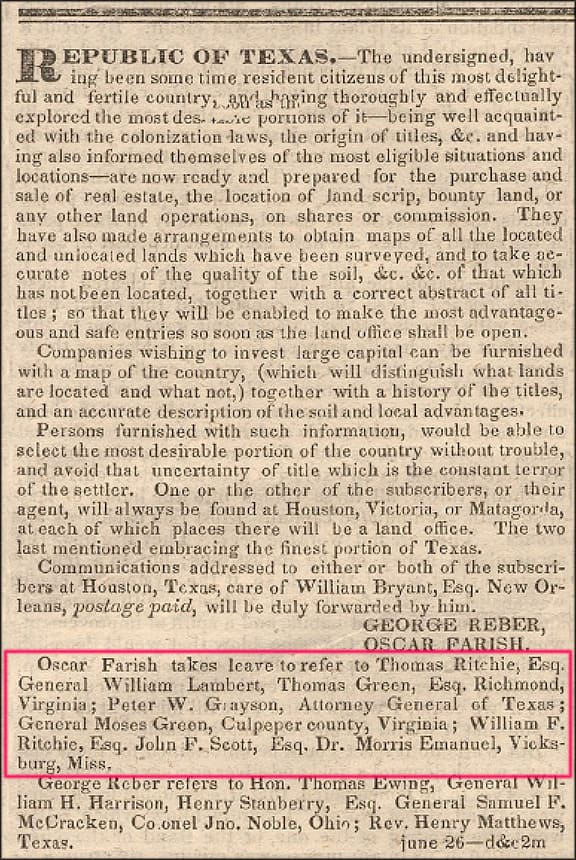
Republic 0f Texas – Dr. Morris Emanuel, Vicksburg, Miss. mentioned – The Daily National Intelligencer, (Washington), 1837
1840: Morris Emanuel – United States Federal Census
1841: Advertisement for Dr. Stillman’s Cards mentions Dr. Morris Emanuel (see below) – The Times Picayune, Saturday, July 17, 1841

Advertisement for Dr. Stillman’s Cards mentions Dr. Morris Emanuel – The Times Picayune, Saturday, July 17, 1841
1844: Morris Emanuel, Delta Kappa Epsilon
1846: “On February 23, 1846, the Southern Railroad Company was chartered in Mississippi to construct a railroad from Brandon eastward through Meridian to the Mississippi-Alabama state line, there to connect with a railroad of the same name in Alabama, but the charter was allowed to lapse without any actual construction being done. The Southern Railroad Company (which should not be confused with the present Southern Railway System), was reincorporated March 9, 1850, as a Mississippi corporation. The controlling spirits of the enterprise were Thomas Bigby, Morris Emanuel, and William C. Smedes of Vicksburg. Mr. Bigby, the principal stockholder, was a prominent merchant and landowner. He served as vice-president of the railroad for a number of years and as president of the road for a time until it was sold to London interests in 1881, when he retired at the age of 80 years. William C. Smedes, the first president of the company, was a distinguished member of the Vicksburg bar and is sometimes referred to as the father of the Southern railroad. Other directors of the Southern Railroad Company were Colonel Nicholas D. Coleman, Ezekiel Pickens, James M. Calhoun, Bartholomew Smith, Alexander H. Arthur, and William H. Siddell.” – – History of Alabama and Vicksburg R.R.
1850: Morris Emanuel, age 46, born about 1804 in Virginia, druggist, Vicksburg, Warren, Mississippi, Agatha A M Emanuel, 38, Mary Emanuel, 9, Lelia Emanuel, 8, Virginia Emanuel 5, William E Emanuel, 2, John M Emanuel 1, Isabella Emanuel, 37 – United States Federal Census
1850: “The road was operated by the trustees until March 8, 1848, when it was sold at sheriff’s sale. A quaint advertisement appearing in a Jackson newspaper in April, 1842, quoted the round-trip fare over the 45-mile line between Jackson and Vicksburg at $5, which amounts to more than 8 cents a mile. The name of the railroad was changed March 9, 1850, to the Vicksburg & Jackson Railroad Company. Morris Emanuel, an enterprising Vicksburg merchant and land owner, was president of the company.” – History of Alabama and Vicksburg R.R.
1860: EMANUEL MORRIS, druggist, Washington st, West side – Vicksburg City Directory
1860: Morris Emanuel, age 56, born about 1804 in Virginia, druggist, Vicksburg, Warren, Mississippi, Agatha Emanuel, 46, Mary Emanuel, 19, Lelia Emanuel, 17, Virginia Emanuel 14, Edward Emanuel, 12, John M Emanuel 10, Morris Emanuel, 8, Isabella Emanuel, 45 – United States Federal Census
1865: “During the next few years the railroad experienced all the vicissitudes of war. The territory through which it passed was drenched with the blood of contending armies, and the railroad and its rolling stock were torn up, burned and laid waste by defenders and invaders alike. The route between Jackson and Vicksburg was almost a solid battleground. The broken uplands in Hinds and Warren counties were scenes of numerous skirmishes and several important battles. Desperate battles were fought near Raymond, at Champion Hill, Bakers Creek, and Big Black Creek. Jackson was sacked and burned and Vicksburg was the scene of one of the greatest military sieges ever witnessed on this continent. The following graphic account of the damage done to the railroad during the war is contained in a report which Morris Emanuel, president of the Southern Railroad, made in the fall of 1865:
At the close of the war we were left to contemplate its blighting effect on our road and property, as evidenced by our tracks torn up, crossties burned, rails bent, twisted and broken, bridges and culverts destroyed, depots burned, cars destroyed, and locomotives and all other machinery in a damaged condition without a dollar in the treasury, with nearly $1,5000,000 of unpaid debts that had matured during the war, besides upwards of $500,000 of unpaid interest coupons, making a total of more than $2,000,000 of indebtedness past due.” – History of Alabama and Vicksburg R.R.
1870: Morris Emanuel, age 66, born about 1804 in Virginia, Railroad President, Vicksburg, Ward 7, Warren, Mississippi – United States Federal Census
1879: Death of Dr. Morris Emanuel notice – Wednesday, May 21, 1879, Daily Commercial (Vicksburg, MS)

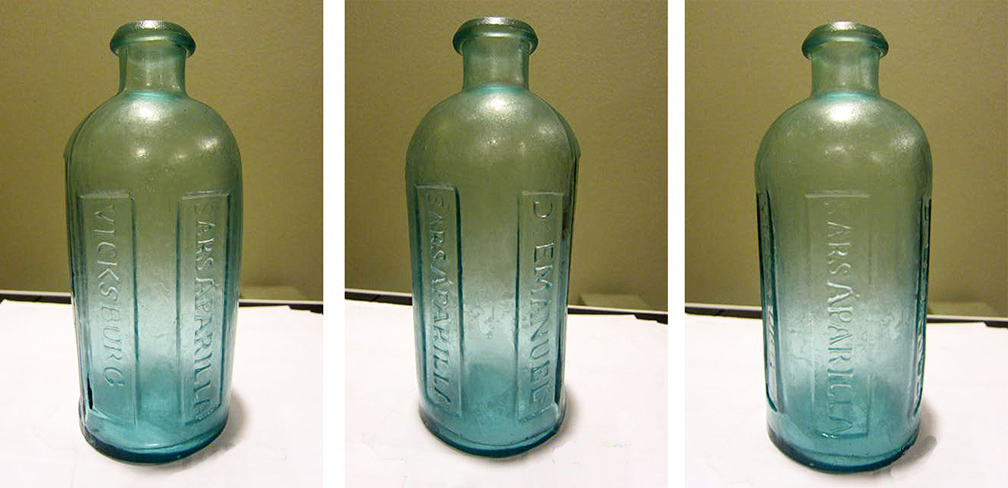
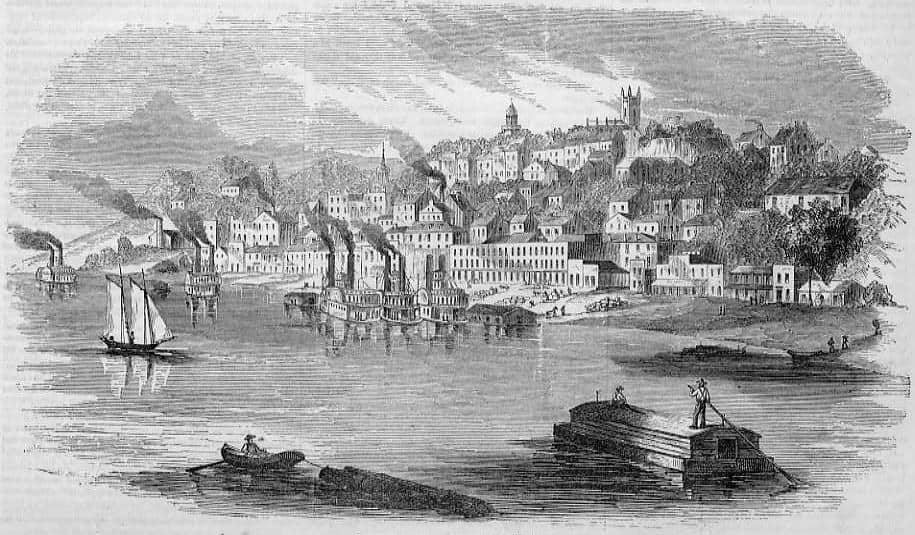
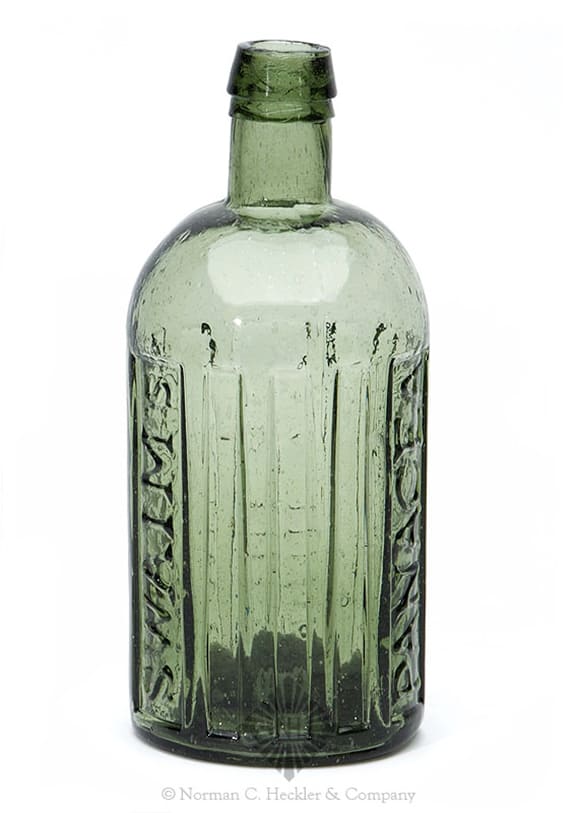
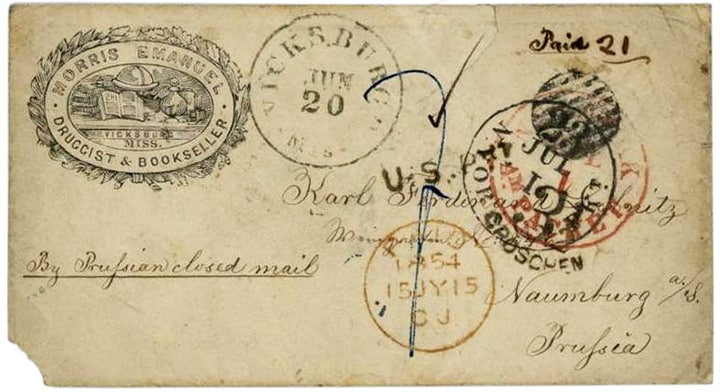
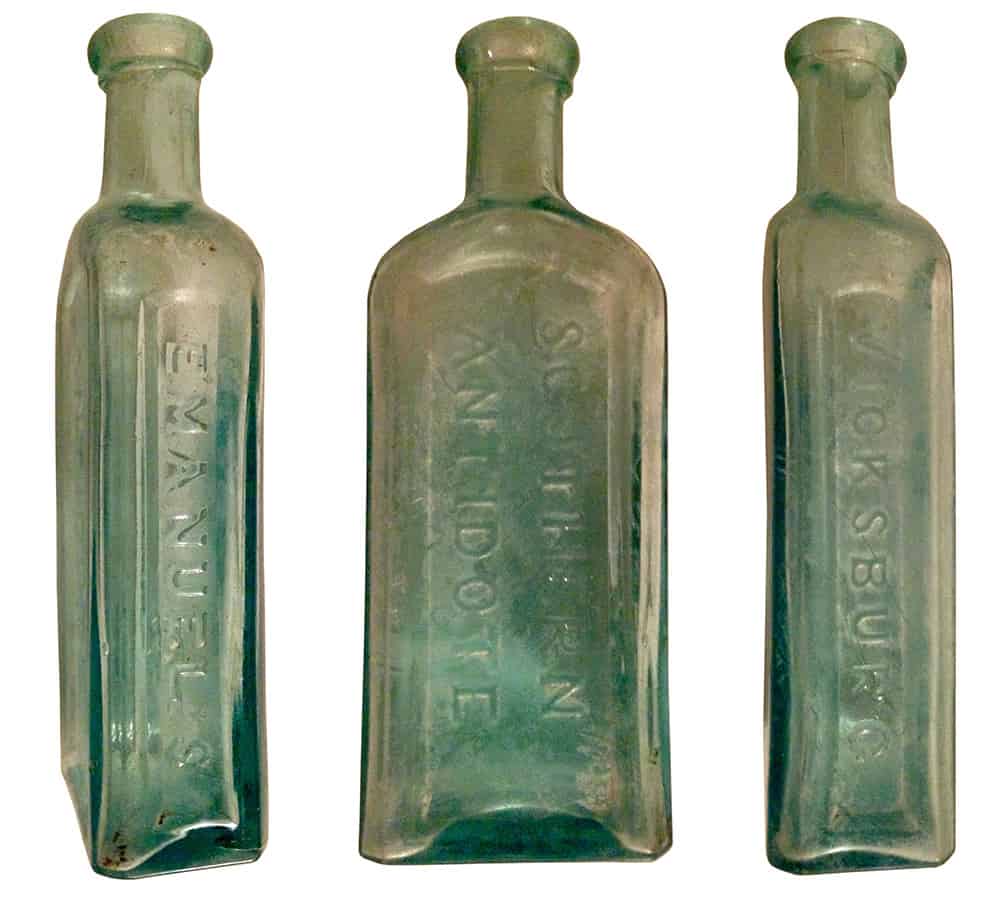
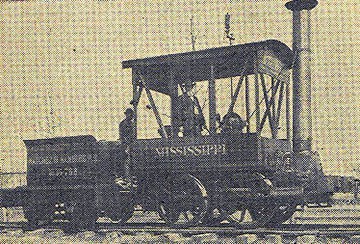
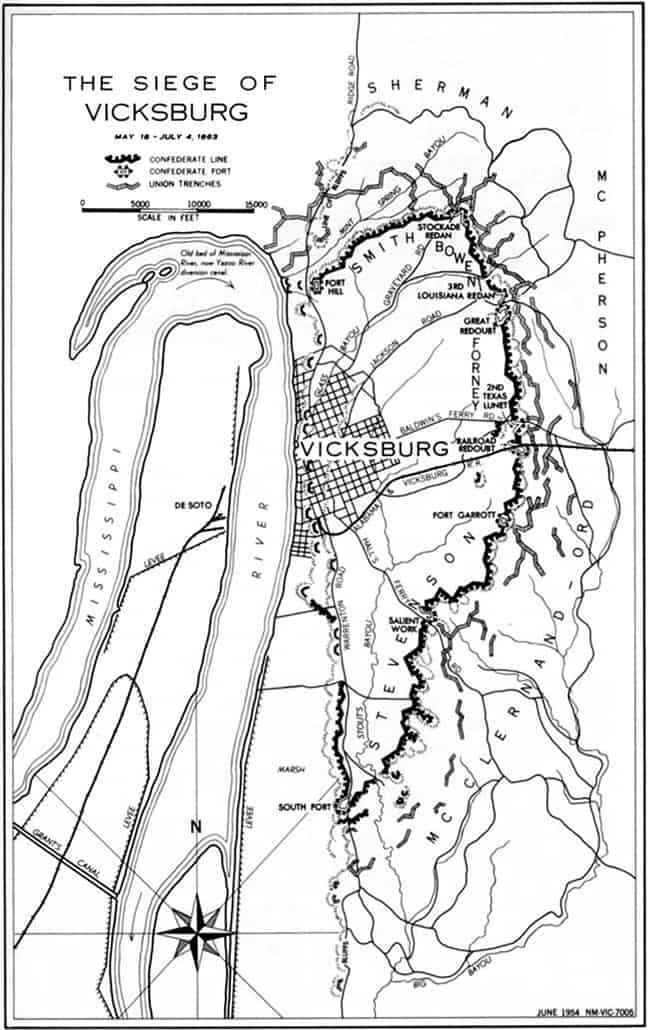
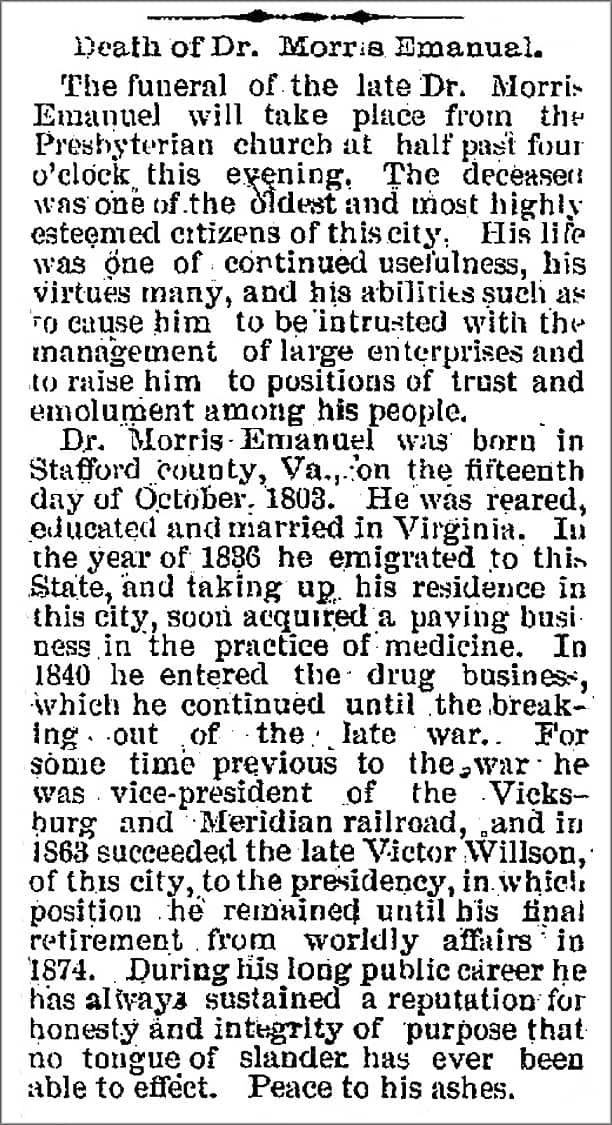






Thank you for doing a post on the Emanuel’s Sarsaparilla, and providing more information on the life of Morris Emanuel. Vicksburg has some great bottles, in general Mississippi has some very early bottles, along with several rare Bitters, that are near impossible to obtain for a collection. Vicksburg is my hometown, I primarily collect Vicksburg bottles, mainly because I feel I have a connection with their history. I am including several pictures of a Emanuel’s Southern Antidote that I was fortunate enough to add to my collection, along with a couple pictures of the O.O. Woodman’s Sarsaparilla from Vicksburg, taken from the Mississippi Antique Bottles and Jugs reference book, both the Emanuel’s and Woodman’s Sarsaparilla bottles are very close in form and rarity. Again thank you for the post on the Emanuel’s, I have always felt Mississippi does not receive any credit for our history of bottles, with the cities of Memphis, New Orleans, and Mobile surrounding our great state, bottles from those cities seem to carry the spot light in the South, and we seem to stay in the shadows. Thank you and your wife for your website, and for all the work done to carry on the history of bottles and the fascinating hobby of bottle collecting. Regards, Chris Brumitt